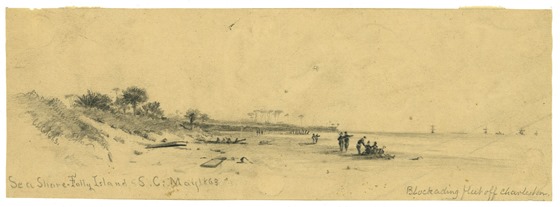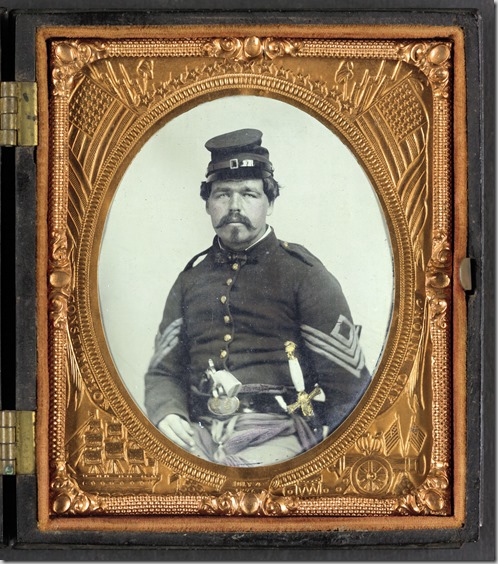9th. Killed beef for Sunday. Read considerably in “Les Miserables.” Reviewed “Fantine.” Never read a book which contained so much truth and sense on every page. Rob and I took a good bath and changed our clothes. Wrote home.
Thursday, May 9, 2013
MAY 9TH.—Orders this morning to draw two days’ rations, pack up and be ready to move at a moment’s warning. We drew hard-tack, coffee, bacon, salt and sugar, and stored them in our haversacks. Some take great care so to pack the hard-tack that it will not dig into the side while marching, for if a corner sticks out too much anywhere, it is only too apt to leave its mark on the soldier. Bacon, too, must be so placed as not to grease the blouse or pants. I see many a bacon badge about me—generally in the region of the left hip. In filling canteens, if the covers get wet the moisture soaks through and scalds the skin. The tin cup or coffee-can is generally tied to the canteen or else to the blanket or haversack, and it rattles along the road, reminding one of the sound of the old cow coming home. All trifling troubles like these on the march may be easily forestalled by a little care, but care is something a soldier is not apt to take, and he too often packs his “grub” as hurriedly as he “bolts” it. We were soon ready to move, and filled our canteens with the best water we have had for months. We did not actually get our marching order, however, until near three o’clock P. M., so that being anxious to take fresh water with us, we had to empty and refill canteens several times. As we waited for the order, a good view was afforded us of the passing troops, and the bristling lines really looked as if there was war ahead.
O, what a grand army this is, and what a sight to fire the heart of a spectator with a speck of patriotism in his bosom. I shall never forget the scene of to-day, while looking back upon a mile of solid columns, marching with their old tattered flags streaming in the summer breeze, and hearkening to the firm tramp of their broad brogans keeping step to the pealing fife and drum, or the regimental bands discoursing “Yankee Doodle” or “The Girl I Left Behind Me.” I say it was a grand spectacle—but how different the scene when we meet the foe advancing to the strains of “Dixie” and “The Bonny Blue Flag.” True, I have no fears for the result of such a meeting, for we are marching full of the prestige of victory, while our foes have had little but defeat for the last two years. There is an inspiration in the memory of victory. Marching through this hostile country with large odds against us, we have crossed the great river and will cut our way through to Vicksburg, let what dangers may confront us. To turn back we should be overwhelmed with hosts exulting on their own native soil. These people can and will fight desperately, but they cannot put a barrier in our way that we cannot pass. Camped a little after dark.
Saturday, 9th—Start this evening, six of us, to Allen County, Ky. Went up in eight miles of Scottsville; stay all night or day in woods. To-night go by Ayres, Will Span’s and old man Span’s. At the latter place we got into hot water. Bushwhackers attacked us, killed my horse, stampeded all. I got separated from the rest, went one mile, got two horses, came on through to New Row Monday, 11th, and on across to Coatstown. Find Will at Mrs. Huffey’s, shot. Miss Sallie Key there on visit. I stay all night.
Sea Shore – Folly Island, S.C. May 1863
Artist – Alfred R. Waud; drawing on cream paper : pencil ; 6.7 x 19.0 cm. (sheet).
Inscribed lower right: Blockading fleet off Charleston.
Library of Congress image.
__________
The only actual fighting to occur on Folly Island was on May 10th, 1863, when confederate forces attacked federal pickets on the left side of Little Folly Island. The fighting was light, as the confederate forces were conducting a reconnaissance mission, aimed mostly at gathering information and taking prisoners. (Source: An Educators Guide to Folly Island, South Carolina.)
May 9. — Weather warm and pleasant. Went over to headquarters to try Lieutenant Oliver’s horse. Major Spaulding’s detachment went into camp with their regiment. Enemy’s tents visible in the same place as before. General Stoneman’s force crossed the river safely, and so the canvas pontoon train returned to camp.
Unidentified soldier in Union first sergeant’s uniform with militia sword and revolver.
sixth-plate tintype, hand-colored ; 9.5 x 8.2 cm (case)
Donated by Tom Liljenquist; 2012
Liljenquist Family Collection of Civil War Photographs; Ambrotype/Tintype photograph filing series; Library of Congress Prints and Photographs Division.
Record page for image is here.
______________
 Note: This image has been digitally enhanced for fade correction, color enhancement and selected spot removal.
Note: This image has been digitally enhanced for fade correction, color enhancement and selected spot removal.
Civil War Portrait 029
by John Beauchamp Jones
MAY 9TH.—The papers contain the following order from Gen. Lee :
“HEADQUARTERS ARMY NORTHERN VIRGINIA,
“May 7th, 1863.
“GENERAL ORDERS No. 59.
“With heartfelt gratification, the General Commanding expresses to the army his sense of the heroic conduct displayed by officers and men, during the arduous operations in which they have just been engaged.
“Under trying vicissitudes of heat and storm, you attacked the enemy, strongly intrenched in the depths of a tangled wilderness, and again on the hills of Fredericksburg, fifteen miles distant, and by the valor that has triumphed on so many fields, forced him once more to seek safety beyond the Rappahannock. While this glorious victory entitles you to the praise and gratitude of the nation, we are especially called upon to return our grateful thanks to the only Giver of victory for the signal deliverance He has wrought.
“It is, therefore, earnestly recommended that the troops unite on Sunday next in ascribing to the Lord of hosts the glory due unto His name.
“Let us not forget in our rejoicing the brave soldiers who have fallen in defense of their country; and while we mourn their loss, let us resolve to emulate their noble example.
“The army and the country alike lament the absence for a time of one to whose bravery, energy, and skill they are so much indebted for success.
“The following letter from the President of the Confederate States is communicated to the army as an expression of his appreciation of its success: [click to continue…]
May 9.—The Charleston Mercury of this date published an article advocating the following plan suggested by the Jackson Appeal:
“How To Meet The Enemy.—The Northern vandals have invaded our State, not to confront our armies and decide the chances of war in pitched battles, but they have come to rob and steal, to plunder, to burn, and to starve to death our women and children. Under such circumstances we should meet them as we would meet the savage, the highwayman, or the wild beast of the forest. Partisan bands should lie in wait for them on the roadside, in fence-corners, and behind trees; and, in short, they should be hunted down in any and every way that can be made efficient and effectual until the State is relieved of their presence. Not observing the rules of civilized warfare themselves, they cannot expect its observance from us. We need more Colonel Blythes in the woods all over the State. A dozen well-directed shots from the bush will at any time put a brigade to flight, and this is the most sure and certain method of putting a stop to the marauding expeditions that are from time to time sent out through the country. In Colonel Blythe’s district or field of operations it has proved most efficacious in holding the enemy at bay, and we hope to see the plan put more extensively in practice. A big scare, occasioned by a brisk fire from a chapparal, is often more potent than would be half a dozen regiments of organized troops in the field.”
—To-night the bombardment of the rebel works at Port Hudson was renewed, and continued for an hour, but the rebels made no reply.
—The Second Indiana cavalry, under the command of Colonel E. M. McCook, made a scout near Stone River, Tenn., visiting the “haunt” of every guerrilla in that vicinity. They succeeded in capturing eight rebels, beside twenty horses belonging to the guerrilla band.—The schooner Sea Lion, from Mobile to Havana, with a cargo of cotton, was captured by the National frigate Colorado.









